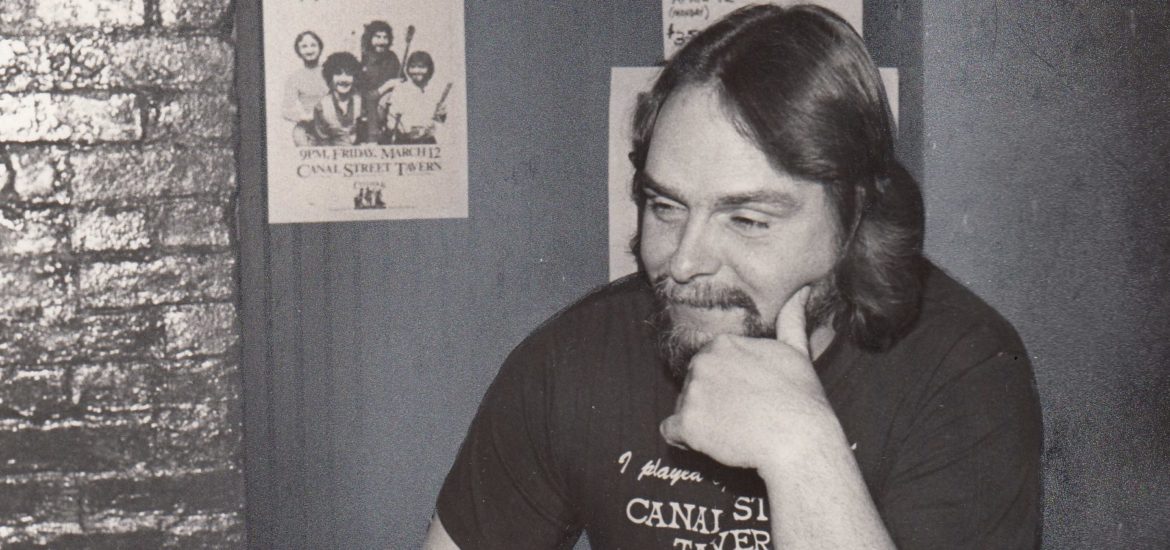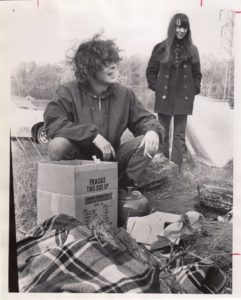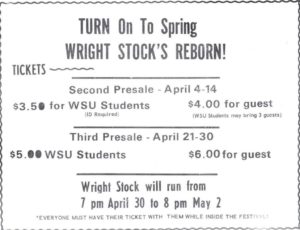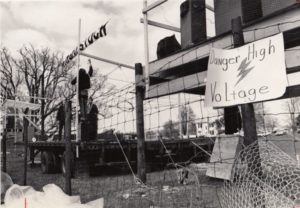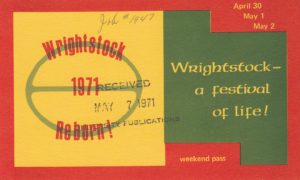The following are parts four and five of a five-part interview with Dayton scene icon Mick Montgomery.
The student president in ’70 had some opposition. When the Fireside Lounge got popular the administration came down on him and told Montgomery the students had to close it. The food distributors on campus had a contract with the university that they were the only ones that could sell food or beverages on campus. The administration pulled the plug. Montgomery tried to rebel with demonstrations but to no avail. The Ratskeller ended up having local bands. A friend played there and told Montgomery they were using the same PA the Fireside Lounge had. The irony was, in the middle of playing music the speaker would come on saying number 946, your pizzas ready.
Overall, Montgomery appreciated his education. “I was glad Wright State was there for me. Wright State was still a state school back (then). I could actually afford it.” On his last visit during the late ‘80s, he got frustrated repeatedly trying to find a parking space, a daily dilemma that’s seemingly decades old.
Many students lived off the land so to speak, living in tents in the woods and going to class. An outdoor concert was a great idea to them, as Woodstock was the previous year. The first Wrightstock was held in May 1970, on Achilles Hill, the back end of the Nutter Center. “The Nutter Center hadn’t been dreamed of yet,” Montgomery muses. There was a big wood’s between the campus and where the Nutter Center is now. “Kids didn’t have money so they’d go and live in the woods, go to school and use the bathrooms on campus to clean up. They were eventually run off.”
The Student Government organized a concert again in 1971 expanding to a three-day event with an 18-band outdoor music festival, officially titled Wrightstock Reborn: The Festival of Life. “It was a pretty big event,” Montgomery remembers. Local complaints about noise, big crowds and clean up ended its two- year run. Montgomery’s not absolutely certain which year he played but believes it was ’71. He had a humorously unique experience early in his set.
“Student government wanted to create a bit of community on campus (with the event). Back then the only kids living on campus were ones that lived farther away. Everyone else would do private housing somewhere. It was a commuter college back then.”
When Wrightstock was happening, most of the people were stoned and a lot of weed was being passed around. “I was supposed to play a set between bands while they changed the stage around. They gave me a vocal and guitar mic, giving them room and time to change amps for the next band.” The stage was on a great big 16-wheeler flatbed with sound system and lights. Most of the bands and musicians played for free.
“I was supposed to do a 35-45 minute set.” Montgomery went onstage a lot sooner than expected. “I was hanging out backstage totally wasted and they said “Hey Mick, you’re up.” I got my guitar and stumbled up on stage. I’ll always remember how kind the sound guy was. He led me up and put the mic up to my guitar and face.” Montgomery was feeling the moment so to speak. “I’m thinking they’re gonna have me check the mics and the sound guy comes over and says “Hey, Mick, you OK?” I say yeah, he says “Well, go on man, do it.”” Montgomery sat there waiting to be announced (in front of a large lawn crowd). “I started playing. I was definitely wasted but thought I was doing a good set.” He did a long alternate version of Fare the Well from the Titanic. Just as he took a deep breath a big cloud of uphill camp fire smoke came downwind making him cough and gag out the rest.
Montgomery was coming down from a heavy mushroom trip and thought the extra smoke ruined the song. People were stoned for three days straight. It was a big deal, when the student government found out they could do events on campus.
Wrightstock marked the beginning of the final stage of Montgomery’s time at Wright State from Grad Assistant to teaching. “I thought I got a pretty good education and stepped into the classroom.” Montgomery occasionally observed students teaching. There was a class in the art education department, where students would teach at Page Manor Elementary. Students in the pre-student teacher class would go in with their lesson plans. Page Manor received art teachers out of it and Wright State got a place to have their teachers get a little classroom experience. “When you’re in education, that last year when you do your student teaching was like a full-time job. You got up and went to school for that whole semester.” Montgomery continued music through his professional career well into his Canal Street Tavern years.
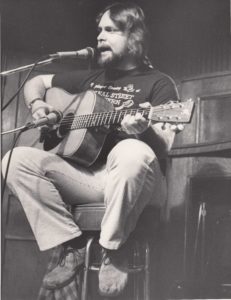 Unsure of getting another assistance-ship he applied with three school systems and was offered two jobs. “I worked for West Carrollton City Schools as an art teacher.” He planned on teaching three or four years and wound up teaching for nine while playing in bands. He started frequenting a club in Downtown Dayton (Sam’s Bar & Grill). He played in Sin City, a country rock band, at the time around town. “We played about once a month.” He ran the open stage every Tuesday night at Sam’s, dubbed the musician’s co-op becoming their biggest night. “I had to schedule people every half hour with people waiting two-three weeks to get a slot. It was happening man!”
Unsure of getting another assistance-ship he applied with three school systems and was offered two jobs. “I worked for West Carrollton City Schools as an art teacher.” He planned on teaching three or four years and wound up teaching for nine while playing in bands. He started frequenting a club in Downtown Dayton (Sam’s Bar & Grill). He played in Sin City, a country rock band, at the time around town. “We played about once a month.” He ran the open stage every Tuesday night at Sam’s, dubbed the musician’s co-op becoming their biggest night. “I had to schedule people every half hour with people waiting two-three weeks to get a slot. It was happening man!”
He eventually decided it was time to move on. “I loved teaching, it was a great job. Getting great experiences working with kids that age was so important for running Canal Street over the years. I took the plunge and got the building downtown.” Montgomery retired from Canal Street in 2013 and now works from home.
Mick Montgomery images courtesy of Special Collections and Archives Wright State University Libraries.
WrightStock images courtesy of WRIGHTSTOCK: The Festival of Life

